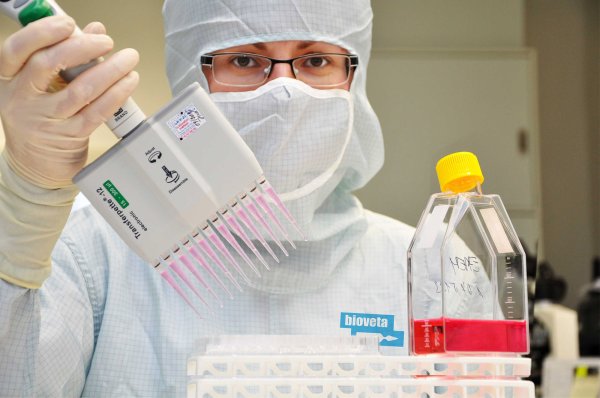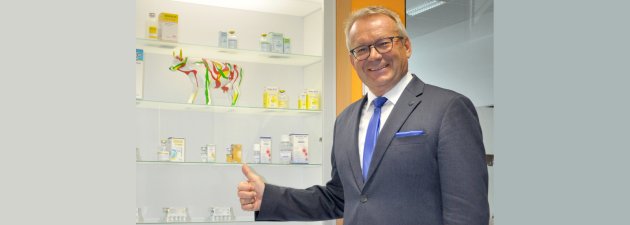Before privatization, the state enterprise Bioveta struggled with overemployment, insolvency, technological obsolescence and inefficient management methods. "When we privatized it in the mid-1990s, we had to reduce the number of employees from 250 to 130 in order to have enough money for salaries. In thirty years, we have increased the revenues from seventy million to three billion CZK, while growing our profit from zero to one billion CZK. Today, we employ around 740 people in plants equipped with state-of-the-art technologies. The company’s success is based on our own R&D and sale of final products with high added value. Our sales have been growing for a long time. Last year alone, we grew by dozens of percent," says Libor Bittner, CEO and co-founder of the pharmaceutical company Bioveta based in Ivanovice na Hané.
When Mr. Bittner entered the world of big business as a 30-year-old with three partners, the state was just beginning to create an institutional framework for the new economic reality and there was a lack of national capital in the market. With no foreign capital, is it even possible to build a competitive company with long-term prospects and manage it even after it grows into a large corporation? "Bioveta has proved that it is possible. The main thing is a working organizational structure and a great motivational system based on material interest, which gives us quality people with high professional competences. The company size is not a problem, either. When the system is set up well, you can hire even a thousand people," the CEO smiles.
When asked about the key moments in the company’s modern history, Mr. Bittner mentions the successful privatization and key contribution to the eradication of rabies in our country. “In the 1980s and 1990s, Europe faced a high incidence of rabies in animals living in the wild. The Czech Republic's long-term project of oral vaccination of foxes against rabies was a unique opportunity for Bioveta. We focused on the development and production of this vaccine and soon entered other European markets with the vaccine. Thanks to this, we were able to repay the privatization loan and invest in the further development and sales support of our entire product range."
Exporting requires patience and knowledge
Currently, the company exports ninety percent of its production. One of the largest European manufacturers of veterinary medicines has never been afraid to seek opportunities in non-European markets as well. Export diversification and building a global customer network has been an integral part of Bioveta’s business strategy since the very beginning. There have only been certain changes in sales support channels. Bioveta gained their first contacts mostly at trade fairs, but with growing international renown, potential customers often approach the company by themselves, based on public information and credentials from their existing clients.
Several non-economic factors also impact the business, with increasing unpredictability and scale in today’s globalized world. "You have to be able to adapt quickly. We export 90 percent of our production to markets all over the world, so geopolitics greatly affects our business strategies, which we have to update continuously."
In addition, doing business in veterinary and human pharmacology is subject to compliance with a wide range of strict regulatory requirements, which may not always be easy due to the unstable security situation. Conditions for the registration of preparations in a given market include regular audits by inspectors of the relevant state institutions in the destination country. "This is where we have recently encountered administrative obstacles, for example with Iran or Russia, as security risks for the Czech Republic. We’ve had to find other markets to make up for the shortfall in revenue in these two very interesting markets in terms of turnover. In Ukraine, where we export in hundreds of millions of CZK, complications with transport prevailed. Due to the border queues of vehicles and farmer blockades, trucks return to us in three to four weeks. Recently, another problem arose on the other side of the world. We had goods lying around in the factory due to Israel shutting down its airspace. For example, we consider the territory of Southeast Asia to be complex but very promising," Libor Bittner points out to indicates where the company could further expand geographically.

Virological lab, purity class A/B. Performing virus titration on cell culture
Southeast Asia in the spotlight
At the moment, Vietnam, Thailand and the Philippines, together with Japan and South Korea, make up three percent of the company's total exports and represent the most interesting markets for Bioveta in the ASEAN countries. In Vietnam, Bioveta has traditionally operated in livestock breeding. The company supplies small and medium-sized farms, who control a large part of the market particularly in the north of the country, with preparations developed based on their specific requirements. Bioveta was also quick to spot a new trend with close monitoring of the local market.
“We have been able to capture the rapid development in small animal care and we are currently supplying our products to hundreds of new clinics there. Thanks to our great relations with professional organizations representing veterinarians and with our educational activities, we are consolidating our position in Vietnam, but also in Thailand, the Philippines, Indonesia and Bangladesh," says Libor Bittner.
However, when joining the WTO, Vietnam undertook that the distribution of products would not be provided by overseas companies. "This is not just about Vietnam. In most Asian countries, our products can only be distributed by a local company or an individual with permanent residence, both officially and unofficially. Since we need to have most of our products registered in these countries and sometimes, like in Vietnam, also tested for import in special labs, it is absolutely crucial for to find a suitable local representative, if we want to succeed," the CEO explains, adding that Bioveta’s local partner is one of the five largest importers in the area.
Add to this the increasingly complex and costly process of registration, particularly of vaccines, and the preference of local organizations and products in this territory. Still, the world-renowned Czech manufacturer still believes that this year, they will be able to win tenders for vaccinating dogs against rabies in Vietnam after a decade. They have already done so in Thailand, after all.
We are open to acquisitions
Over thirty years, some companies with purely Czech capital have become so strong that they ranked among the most active in mergers and acquisitions in the CEE region last year. "Organic growth is important and has brought us excellent economic results so far. However, we are open to acquisitions. Our product range covers all categories of animals, including camels and beasts. Except fish, which is logical, as Czechia is not a coastal state. But I would love to find a company for sale that develops and manufactures fish vaccines. That would fit nicely into our portfolio," Libor Bittner concludes.
Written by Věra Vortelová
Photo credits: Bioveta


 Jižní Korea
Jižní Korea
